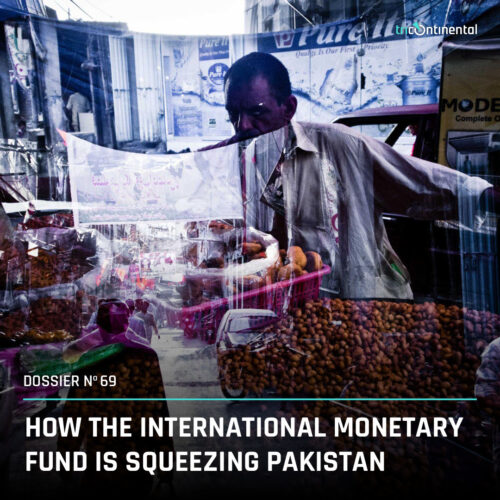The IMF’s Neocolonial Grip on Pakistan Is the Same as Its Grip on the Third World
Pakistan has made international headlines repeatedly over the last year for almost all the wrong reasons. While the country has been associated with extremism and terrorism for over two decades, more recently Pakistan has become known for natural disasters and political upheavals. Among the issues that deserve serious scrutiny – but gets little to no attention – is the alarmingly unprecedented contraction of the country’s economy, projected to grow a mere 0.5% in 2023 and experience inflation rates upwards of 27%. Given that Pakistan’s population is increasing at a rate of 1.8%, outpacing national economic expansion, the Gross Domestic Product per capita will shrink. Put plainly, the Pakistani people are going to be significantly poorer in the coming years.
Dossier no. 69, How the International Monetary Fund Is Squeezing Pakistan, unpacks the country’s worrisome economic indicators, debunks the common – but mistaken – explanations, illuminates why this mineral-rich, agriculturally fertile southeast Asian country remains import-dependent, and delves into the political and military ramifications of the economic crisis and its devastating implications for the class struggle in Pakistan.
Furthermore, it explains the role of the International Monetary Fund (IMF) in completely undermining Pakistan’s control over its own economy and in restricting the country’s development aspirations. Pakistan is by no means an extraordinary case; it merely illustrates the IMF’s general template for all economies, whether large or small, with little interest if its actions turn a cyclical recession into a depression. As the dossier notes, the historic task placed before the people of Pakistan and the entire Third World today, therefore, is to organise, mobilise, and struggle for economic independence.
• Check out Tricontinental: Institute for Social Research’s dossier no. 69, How the International Monetary Fund Is Squeezing Pakistan.
Vijay Prashad is an Indian historian and journalist. Prashad is the author of twenty-five books, including The Darker Nations: A People’s History of the Third World and The Poorer Nations: A Possible History of the Global South. Read other articles by Vijay, or visit Vijay's website.
No comments:
Post a Comment